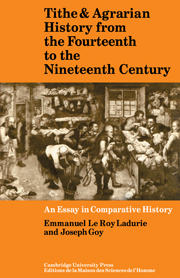 Tithe and Agrarian History from the Fourteenth to the Nineteenth Century
Tithe and Agrarian History from the Fourteenth to the Nineteenth Century Book contents
- Frontmatter
- Contents
- List of figures
- Preface
- Part I Methodology
- 1 The tithe: an old source for new research
- 2 The tithe in France and elsewhere
- 3 Methodology
- 4 Towards another kind of history of the tithe, production and productivity
- Part II Comparative study of trends
- Notes
- References
- Title in the series
- Industrialization before Industrialization Rural Industry in the Genesis of Capitalism
4 - Towards another kind of history of the tithe, production and productivity
Published online by Cambridge University Press: 05 November 2011
- Frontmatter
- Contents
- List of figures
- Preface
- Part I Methodology
- 1 The tithe: an old source for new research
- 2 The tithe in France and elsewhere
- 3 Methodology
- 4 Towards another kind of history of the tithe, production and productivity
- Part II Comparative study of trends
- Notes
- References
- Title in the series
- Industrialization before Industrialization Rural Industry in the Genesis of Capitalism
Summary
It is obvious that, in this rapid description of sources and methods, it has not been possible to mention all the studies of rural societies concerned with dues, production and productivity. The tithe, ground rents and estate accounts are not the only documents which can be used, and there are many trails still to be explored. Let us give two examples. French historians have perhaps not paid enough attention to sources which, while not really serial, are often very precise and entirely suitable for the study of the gross product over the short and medium term. These include, for example, the declarations of income made by the priests of France in the eighteenth century: in 1701 the general assembly of French clergy, which was responsible for deciding how much each diocese had to contribute towards the king's don gratuit, organized a national survey. On at least three occasions in the eighteenth century (in 1728, 1751 and 1760) the priests returned information on their income and these documents, preserved partly in the Archives Nationales, in G8, and partly in the departmental archives, enable us to make cross-sections and to form some impression of the gross product.
Information
- Type
- Chapter
- Information
- Tithe and Agrarian History from the Fourteenth to the Nineteenth CenturyAn Essay in Comparative History, pp. 61 - 68Publisher: Cambridge University PressPrint publication year: 1982